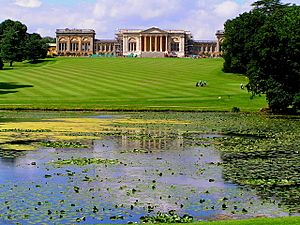Jack Hayward facts for kids
Quick facts for kids
Jack Hayward
|
|
|---|---|
| Born |
Jack Arnold Hayward
14 June 1923 |
| Died | 13 January 2015 (aged 91) Fort Lauderdale, Florida, U.S.
|
| Nationality | British |
| Known for | Owner of Wolverhampton Wanderers F.C. (1990–2007) |
| Predecessor | Gallagher Estates |
| Successor | Steve Morgan |
| Relatives | Sir Charles Hayward (father) |
Sir Jack Arnold Hayward (born June 14, 1923 – died January 13, 2015) was a famous English businessman. He was also a property developer and a very generous person (a philanthropist). Many people knew him as the president of his favorite football club, Wolverhampton Wanderers.
Contents
Sir Jack Hayward's Life Story
Growing Up
Jack Hayward was born in Wolverhampton, England. He was the only son of Charles William Hayward, a successful industrialist. Jack went to Northaw Preparatory School and then Stowe School in Buckinghamshire.
When World War II started, he bravely cycled to Oxford to join the fight. He became part of the Royal Air Force (RAF). He trained as a pilot in Yorkshire and Florida. Jack flew Dakota planes to deliver supplies. He helped the 14th Army in Burma. By 1946, he was a flight lieutenant.
His Career
After the war, Jack started working for Rotary Hoes. This company was part of the Firth Cleveland group, owned by his father. He began as a salesman for farm equipment in South Africa. In 1951, he started the American branch of the company in New York City.
Five years later, he moved to the Bahamas. His father had already started business there. Jack arrived in Grand Bahama in 1956. He became a vice-president of the Grand Bahama Port Authority. This group helped develop the city of Freeport. Jack continued his family's work in the Bahamas.
Besides his home in Freeport, he owned a farm in Sussex, England. He also owned a large estate in Scotland called Dunmaglass. In 2009, he was one of Britain's richest people.
His Love for Wolverhampton Wanderers F.C.
Jack Hayward was a huge fan of Wolverhampton Wanderers football club. He first watched them play when he was just five years old. He had two chances to buy the club in 1982 when they faced money problems. But he didn't buy them then.
Finally, in May 1990, Jack bought the club for £2.11 million. He became the owner and chairman. Over 17 years, he spent over £70 million of his own money. He used it to improve their Molineux Stadium, pay off debts, and buy new players.
During his time as owner, the club had seven different managers. They all tried to make Wolves a top-tier team. They only played one season at the highest level (2003–04). Still, Jack's money helped Wolves get many talented players. These players would normally be too expensive for clubs outside the Premier League.
In 2007, he sold the club to businessman Steve Morgan. He sold it for a very small fee of £10. In return, Steve Morgan promised to invest £30 million in the club. Jack Hayward remained the life president of Wolverhampton Wanderers. He was later added to the club's Hall of Fame.
Jack Hayward was known as one of the special football fans. He spent huge amounts of time and money to save his hometown club. Other people like him include Jack Walker (Blackburn Rovers) and Dave Whelan (Wigan Athletic).
His Charity Work
Jack Hayward was knighted in 1986 for his charity work. He had already received an OBE award in 1968. He gave money in 1969 to buy Lundy Island for the National Trust. He also helped buy the SS Great Britain ship. More recently, he gave £500,000 to help the Vulcan to the Sky fund.
He also helped repair the King Edward VII Memorial Hospital. This was on the Falkland Islands after the Falklands War. He was also the secret donor of £1 million to the South Atlantic Fund. This fund helped families of British soldiers who were hurt or killed in that war.
Jack funded three international racing yachts. He also spent £100,000 to save the ship Gannet. He gave another £100,000 to help raise the Mary Rose ship. He was friends with cricketer Rachael Heyhoe Flint. He paid for the England women's cricket team to tour the West Indies. In 1973, he sponsored the first-ever women's cricket World Cup. This was two years before the men's first World Cup.
His Style and Patriotism
In the Bahamas, Jack Hayward was called "Union Jack." This was because of his strong British patriotism. He brought 10 red London buses to Freeport. He also put up British-style red telephone and pillar boxes. Sailors from the Royal Navy visiting Freeport always got a free dinner from Sir Jack.
In Britain, he drove a Range Rover with a special bumper sticker. It said: “Buy abroad — sack a Brit.” In the Who's Who book, he listed his hobbies. They included "promoting British endeavors, mainly in sport." He also enjoyed "protecting the British landscape, keeping all things bright, beautiful and British."
People noticed that Jack Hayward often wore crumpled clothes. His pockets were full of bits of paper. He looked more like a retired geography teacher than a rich man. He liked watching cricket. He was a life member of Surrey County Cricket Club. He also enjoyed acting in amateur plays. He even built a modern theater in Freeport for the local Players’ Guild. He was a main actor in their shows.
His Family
Jack Hayward married Jean Mary Forder in 1948. They had two sons, Rick and Jonathan, and a daughter, Susan. Susan had three children: Emma, AJ, and Nicolas. Both of her sons were involved with Wolverhampton Wanderers. Jonathan joined the club's board when his father took over in 1990. Rick later became chairman of the club in 2003.
Jack Hayward was given the freedom of the City of Wolverhampton in 2003. He passed away on January 13, 2015, in Fort Lauderdale, Florida, at the age of 91.
Legacy

Many places were named after Sir Jack Hayward. The Sir Jack Hayward High School in Freeport, Bahamas, was named in his honor in 1998. The training complex for Wolverhampton Wanderers at Compton is also named after him.
A street next to the Molineux football ground, previously Molineux Way, was renamed Jack Hayward Way in 2003. This was to celebrate his 80th birthday. The Grand Bahama Highway Bridge was also renamed the Sir Jack Hayward Bridge. He had worked for 10 years to get this bridge built.
After his death, the South Bank of Molineux was renamed the Sir Jack Hayward Stand.
See also
- List of residents of Wolverhampton
- Dunmaglass Shooting Estate
 | Emma Amos |
 | Edward Mitchell Bannister |
 | Larry D. Alexander |
 | Ernie Barnes |


